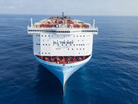Maersk and Danone Partner to Cut Scope 3 Emissions

The collaboration between Maersk and Danone represents a strategic effort to tackle indirect Scope 3 emissions, especially in the seaborne logistics supply chain segment.
It highlights how companies can drive sustainable change and reduce greenhouse gas emissions in transportation and distribution, aligning with their broader sustainability goals.
Lowering emissions with Maersk ECO Delivery Ocean
A vital feature of Maersk and Danone's collaboration is the former's ECO Delivery Ocean product, which plays a central role in reducing emissions related to transporting Danone's products.
Using biodiesel and bio-methanol fuels sourced solely from waste feedstocks, ECO Delivery Ocean reduces greenhouse gas (GHG) emissions by a substantial margin.
"With Danone's applied version of ECO Delivery Ocean, GHG emissions are reduced by more than 40% compared to conventional fossil fuels."
This substantial reduction showcases the effectiveness of alternative fuels in mitigating Scope 3 emissions tied to transportation, marking a significant step toward more sustainable logistics.
- Category 1 | Purchased Goods and Services Using Maersk's ECO Delivery Ocean product, Danone indirectly addresses e | missions associated with purchasing transportation services.
- Category 2 Capital Goods (indirectly) From Danone's perspective, Maersk's investment in methanol-enabled vessels and other green technologies to support this partnership could be considered part of this category.
- Category 4 | Upstream Transportation and Distribution The partnership focuses on reducing greenhouse gas emissions in seaborne logistics through Maersk's ECO Delivery Ocean service, which uses sustainably sourced fuels like biodiesel and bio-methanol.
Aligning with Corporate Sustainability Goals
Danone's commitment to reducing emissions is reflected in this partnership.
"The ECO Delivery Ocean product and its reduced greenhouse gas emissions align well with our decarbonisation strategy to focus primarily on alternative fuels and multimodal transportation," says Jean-Yves Krummenacher, Global Chief Procurement Officer at Danone.
Danone supports its commitment to alternative fuel use through this partnership, which is integral to its broader emission-reduction objectives.
Science-based targets for a sustainable future
Maersk and Danone have set ambitious science-based targets, reinforcing their long-term dedication to sustainable practices.
Danone aims for net-zero emissions by 2050, while Maersk targets the same by 2040.
The targets not only demonstrate each company's commitment to reducing Scope 3 emissions but also ensure their actions align with international climate objectives.
This shared commitment to science-based targets highlights the partnership's broader significance in maritime logistics, positioning both companies as sustainable supply chain transformation leaders.
Setting an industry example for Scope 3 emissions reduction
The partnership between Maersk and Danone serves as a model for other companies aiming to reduce their Scope 3 emissions, especially those in transportation and logistics.
Emilio de la Cruz, Maersk Area Managing Director for South West Europe, sees this collaboration as a leadership opportunity, noting: "Well-known companies like Danone can act as a beacon in their industries by using effective levers to decarbonise their supply chains."
Danone's leadership in addressing emissions related to logistics not only strengthens its sustainability commitment but also sets a precedent for other organisations to follow suit.
A holistic approach: From ocean to inland transport
The reach of Maersk and Danone's partnership stretches beyond ocean logistics to encompass inland transport solutions and dedicated control towers, adding a comprehensive layer to the emissions reduction efforts.
By addressing all aspects of transportation in the supply chain, the companies take a more holistic approach to tackling Scope 3 emissions, which are often the hardest to manage due to their indirect nature.
The extended scope reinforces the partnership's potential impact, touching on multiple points within the transportation and distribution network, amplifying Scope 3 emissions reductions.
Shaping a sustainable supply chain future
Maersk and Danone's partnership provides a roadmap for addressing indirect emissions, particularly in maritime logistics, a field with traditionally high Scope 3 emissions.
The collaboration demonstrates how companies can make meaningful reductions in their supply chains by embracing alternative fuels, setting science-based targets and working towards comprehensive transport solutions.
Receive the next edition of Scope 3 Magazine by signing up for its newsletter.
As part of this portfolio, make sure you check out Procurement Magazine and also sign up to our global conference series - Procurement & Supply Chain LIVE.
Also check out our sister brand, Sustainability Magazine and sign up to its global conference series - Sustainability LIVE.
Scope 3 Magazine is a BizClik brand.
- Maersk Sustainability Reporting: Navigating Scope 3Transportation & Logistics
- SHEIN’s Scope 3 Emissions: Fast Fashion’s Carbon BurdenCircular Economy
- Tackling Super Bowl LIX's Scope 3 Emissions ChallengeScope 1 2 and 3
- NetApp’s SBTi Validation Marks Sustainability MilestoneScope 1 2 and 3
Featured Articles
Estonia, Latvia and Lithuania join the European grid, cutting ties with Russian energy, a move that boosts regional security and sustainability
TÜV SÜD: New battery regulations bring Scope 3 hurdles, requiring sustainable sourcing, digital traceability and design changes increasing compliance
Nissan is scaling up its use of green steel, reducing CO2 emissions in its supply chain as part of its goal to achieve carbon neutrality by 2050

